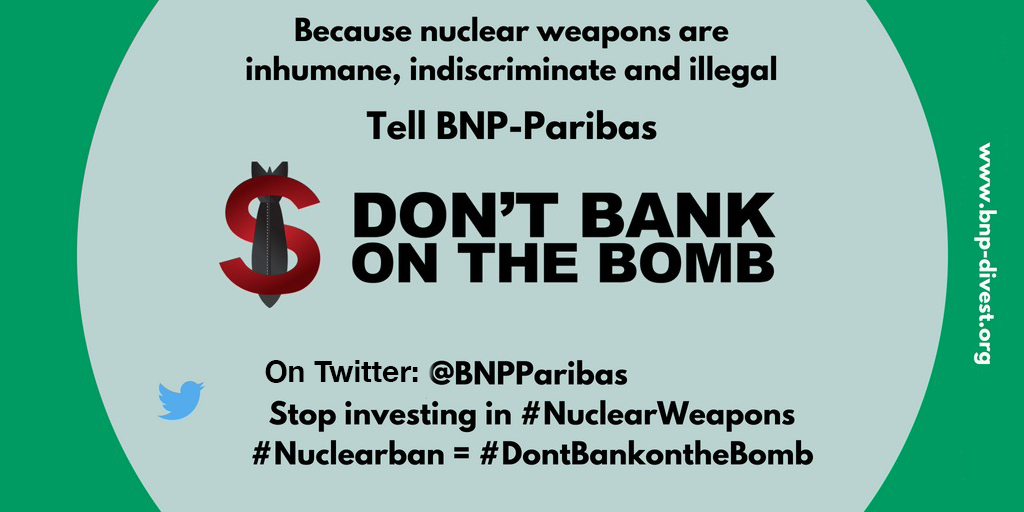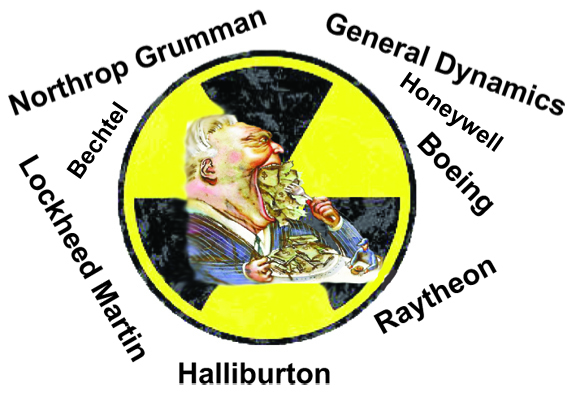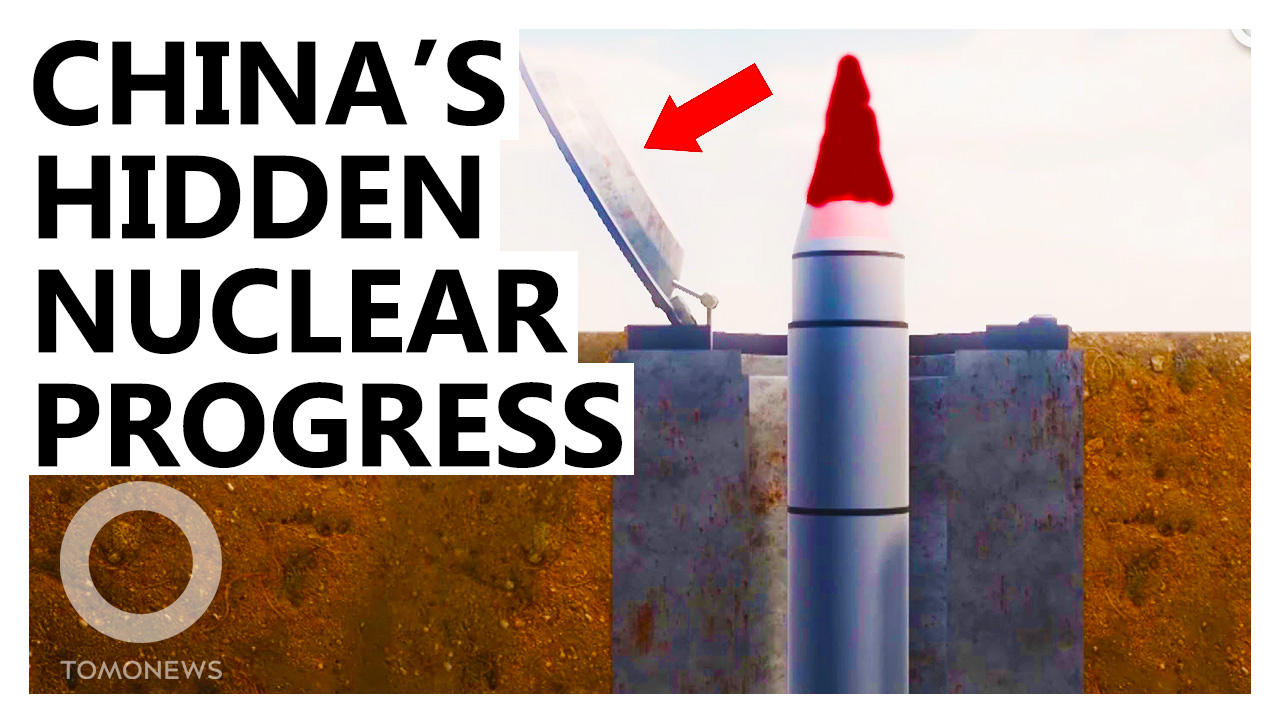
Perilous Profiteering:
The Top 25 Global Nuclear Weapons Companies
Beatrice Fihn / International Campaign to Abolish Nuclear Weapons (ICAN)
What You Need to Know:
• Fewer banks are investing in the companies behind nuclear weapons
• But, more cash is getting invested
• 25 companies are identified that are significant contributors to the nuclear arsenals of China, France, India, Russia, UK & the US (and this is the first time we see Chinese & Russians on the list)
• US investors still dominate the top 10
• There are almost no investments from banks in countries that have joined the Ban Treaty.

(November 11, 2021) — We’re moving the money. If you only take one thing away from this email, it is that we moved $63 billion in funds away from the companies producing nuclear weaponsin the last 2 years.
Today, PAX and ICAN are releasing the latest Don’t Bank on the Bomb report “Perilous Profiteering: The companies building nuclear arsenals and their financial backers” [see report below], which names the 338 investors backing 25 nuclear weapon producing companies and the size of their investments. This report is also the first time we were able to find information on Russian and Chinese investments.
But that’s not the most interesting part. The report also found three clear signs that financial institutions are starting to see nuclear weapons as risky business, and are leaving them behind:
• From 2019 to 2021, the total amount made available for nuclear weapons producing companies dropped by an impressive $63 billion, and the total number of financial institutions willing to invest in nuclear weapons producing companies went down too.
• Nuclear weapons producing companies, despite billion dollar contracts, have debt. But investors are moving away. So instead, they’re borrowing from wherever they can to raise cash. In other words: producing weapons of mass destruction has become extremely unattractive.
• 127 financial institutions stopped investing in companies producing nuclear weapons this year!
Of course, we still have a lot of work to do to hold these profiteers accountable. Banks, insurers, asset managers and pension funds still made $685 billion available for the companies producing nuclear weapons (like Northrop Grumman, which has $24 billion in outstanding contracts).
Our banks, insurers, and pension funds have no business investing in companies that choose to be involved in illegal weapons of mass destruction, and we need to tell them. Can you start today by reading and sharing the key findings of the report?
Beatrice Fihn is the Executive Director of ICAN

Perilous Profiteering: The Companies Building
Nuclear Arsenals and their Financial Backers
The 2021 report “Perilous Profiteering: The companies building nuclear arsenals and their financial backers” is a joint publication of ICAN and it’s partner PAX. The report details how 338 financial institutions made $685 billion available to 25 nuclear-weapon-producing companies from China, France, India, the Russian Federation, the United Kingdom and the United States.
This report looks at those with vested interests to keep a nuclear arms race going. The companies that want to get contracts to build weapons of mass destruction, and the private sector financiers and investors that want to generate a profit without apparent concern for the devastating potential consequences of any use of the products they support. It is only by knowing those who seek to maintain the status quo that we can engage and shift their behavior.
The Companies Building Nuclear Arsenals and their Financial Backers

Executive Summary
Susie Snyder / ICAN
UTRECHT (November 2021) —Nuclear weapons are prohibited by international law, yet 25 companies remain heavily involved in their production, manufacture and development. These companies are supported by 160 banks that lend them money or underwrite bonds, while another 186 institutions seek to pro t from holding shares or bonds. Altogether 338 financial institutions made more than $685 billion available to the nuclear weapon industry since 2019.
In January 2021, the Treaty on the Prohibition of Nuclear Weapons (TPNW) entered into force. The treaty explicitly prohibits the manufacture, production and development of nuclear weapons, as well as assistance with those prohibited acts. Financial institutions are divesting from their nuclear weapon related holdings, the number of total investors continues to drop with every Don’t Bank on the Bomb publication.
Nuclear weapons are controlled by governments, but their production is often contracted to private companies. This is the situation in about half of the nuclear armed countries, though in bringing together materials to develop, test, produce, manufacture or stockpile nuclear weapons it is safe to assume there is a great deal of private sector involvement along the supply chain. Companies in China, France, India, Russia, the United Kingdom, and the United States, are listed in this report along with information about the key components they produce for nuclear arsenals.
Nearly every country in the world has undertaken a legally binding agreement to, at a minimum, negotiate the disarmament of nuclear arsenals. Many countries worked together to fulfill this obligation by negotiating the TPNW, yet the nine nuclear-armed countries are doing the opposite. They are spending upwards of 100,000 per minute on a new nuclear arms race.
This report looks at those with vested interests to keep a nuclear arms race going. The companies that want to get contracts to build weapons of mass destruction, and the private sector financiers and investors that want to generate a pro t without apparent concern for the devastating potential consequences of any use of the products they support. It is only by knowing those who seek to maintain the status quo that we can engage and shift their behavior.
These profiteers can and do change their behaviors. A combination of the emerging norm against nuclear weapons, the growing strength and membership of the TPNW, and the increasing stigma against weapons designed for mass destruction are leading companies away from harmful contracts and investors to consider alternatives.
Key Findings

$685 Billion Invested
$685,184 million was made available to the 25 nuclear weapons producing companies between January 2019 and July 2021, a $44 billion increase from the previous year. The increase can be attributed to $80 billion more underwriting in 2021 compared to 2020. The nancial sector helped the nuclear weapon industry sell pieces of its debt. Shareholding values dropped by $67 billion, and bondholding value by $2 billion.
52 Fewer Financial Institutions Invested in Nuclear Weapons
338 institutions have financing or investment relationships with the 25 nuclear weapon producing companies, down from 390 institutions the previous year.
25 Companies Producing Nuclear Weapons
Companies from China, France, India, Italy, the Netherlands, the Russian Federation, the United Kingdom and the United States are significantly involved in the production of nuclear weapons. Many of the companies involved have multi-year production contracts, totaling at least $200 billion and continuing for decades.
Northrop Grumman is the biggest single nuclear weapons profiteer, with at least $24 billion in contracts, not including consortium and joint venture revenues. Raytheon Technologies and Lockheed Martin also hold multi-billion-dollar contracts to produce new nuclear weapon systems.
The list of companies profiled in this report and the arsenals to which they contribute are:
1. Aerojet Rocketdyne (United Kingdom, United States);
2. Airbus (France);
3. BAE Systems (France, United Kingdom, United States);
4. Bechtel (United States);
5. Bharat Dynamics (India);
6. Boeing (United Kingdom, United States);
7. China Aerospace Science and Technology (China);
8. Constructions Industrielles de la Méditerranée (France);
9. Fluor (United States);
10. General Dynamics (United Kingdom, United States);
11. Honeywell International (United States);
12. Huntington Ingalls Industries (United States);
13. Jacobs Engineering (United States);
14. L3 Harris Technologies (United States);
15. Larsen & Toubro (India);
16. Leidos (United States);
17. Leonardo (France);
18. Lockheed Martin (United Kingdom, United States);
19. Northrop Grumman (United Kingdom, United States);
20.Raytheon Technologies (United States);
21. Rostec (Russian Federation);
22.Safran (France);
23. Textron (United States);
24. Thales (France), and;
25. Walchandnagar Industries Limited (India).
Introduction

Nuclear weapons remain the worst weapon ever deployed. They are designed to cause mass murder, mayhem and catastrophe. The primary ideology behind the retention of nuclear weapons in the arsenals of nine countries, or the security strategies of their allies, is one of deterrence. An idea predicated on breaking the laws of war, an ever-present threat to civilization as we know it.
Nuclear weapons cannot be used without breaking international law. These bombs are designed to destroy cites in a ash. Nuclear weapons development, production and testing has left a contaminating legacy that will remain for hundreds of generations.
If a nuclear bomb is dropped in your neighborhood, there is no help coming. That is why most countries have rejected nuclear weapons. Even though advanced nuclear progress were developed in several dozen countries, only ten crossed the threshold and possess nuclear weapons now.
The consequences of nuclear weapons cannot be controlled in time nor space, so governments negotiated the Treaty on the Prohibition of Nuclear Weapons (TPNW). The treaty entered into force in January 2021. The treaty explicitly prohibits the manufacture, production and development of nuclear weapons, as well as assistance with those prohibited acts.
Despite global calls for restraint and nuclear disarmament, new nuclear weapons are being developed in all nuclear armed countries. The report includes information about the nuclear weapon programs of the five countries legally obligated under the nuclear Non Proliferation Treaty to negotiate the disarmament of their arsenals, as well as the nuclear program of India.
New nuclear weapons systems, including the US Ground Based Strategic Deterrent and Long-Range Standoff weapons, the French ASMPA-successor the ASN4G, and the Indian e orts to expand to submarine launched ballistic missiles are also presented in this report.
Several of the nuclear-armed countries are also investing in developing hypersonic missile technologies, but at this stage of the research and development it is still unclear whether those new missiles will carry a nuclear or conventional payload.
Impact of the Treaty on the Prohibition of Nuclear Weapons
The nuclear industry is changing. The re-nationalization of the UK’s Atomic Weapons Establishment — removing Serco from the list of publicly traded companies involved in the production and maintenance of nuclear arsenals — is one example.
The sale of all government related contracts of another long-term nuclear weapon associated company (AECOM) so that it is no longer involved in any aspect of nuclear weapon development or stockpiling is another. These changes removed these companies from their association with the production of nuclear weapons, as well as several investor blacklists.
More than 100 financial institutions divested from the nuclear weapon industry in the last year. Several of these are from states that joined the TPNW. This includes the Bank of Ireland and AIB (Ireland), and Investec (South Africa). While other institutions made new investments, these are predominantly from countries not yet a member of the TPNW.

Nuclear-weapon-producing Companies
For a company to be included in the list of nuclear weapon producers, it must be open to private investment and produce goods or services that specifically contribute to nuclear weapon development, testing, production, manufacture, possession, stockpiling or use. These activities are outlawed under the Treaty on the Prohibition of Nuclear Weapons.
Northrop Grumman is the biggest nuclear weapons profiteer, with at least $24 billion in outstanding contracts, not including the consortium and joint venture revenues. Raytheon Technologies and Lockheed Martin also hold multi-billion-dollar contracts to produce new nuclear weapon systems.
The consortiums and joint ventures involved in producing nuclear arsenals also have multi-year multi-billion-dollar contracts. For example, National Technology and Engineering Solutions of Sandia (NTESS), a wholly owned subsidiary of Honeywell, has a $40.6 billion contract for the management and operation of Sandia National Laboratories (SNL) where new warheads for the US arsenal are built. Or the millions paid each year by the French government to the MBDA joint venture between BAE Systems, Airbus and Leonardo to build the next generation nuclear weapons for France.
There are changes in the number of nuclear weapon associated companies. Some companies, like Serco, had long-term contracts government contracts revoked. Others, like AECOM, have chosen to end their involvement in the nuclear weapon industry. The industry itself is getting smaller, with companies acquiring or merging together. Raytheon and United Technologies is one example, Northrop Grumman’s acquisition of Orbital ATK is another.
Mergers and acquisitions have always been a way to gain advantage when competing for contracts, and the same holds true in the nuclear weapon industry. By buying up key suppliers of specific technologies, the ability of others to compete is reduced. In 2021, Lockheed Martin will do the same, as it in the process of acquiring Aerojet Rocketdyne.
The reduction in the number of contractors in the nuclear weapon industry makes it easier for financial institutions and other investors to exclude them from investments. Instead of tracking down hundreds, or even thousands of contributors to catastrophic threats, it’s simply a matter of exiting a few relationships.
Renationalization of the Atomic Weapons Establishment
— an illustration of Increased Risk
The UK Atomic Weapons Establishment’s involvement with Trident missiles covers the entire life cycle, from initial concept to assessment, design, component manufacture and assembly, in-service support and decommissioning and disposal. In February 2020, the UK Defense Secretary announced to UK Parliament the start of a new project for new nuclear warheads, to be built at AWE facilities.
The consortium AWE-ML comprised of Serco, Jacob’s Engineering and Lockheed Martin had a 25 year-long non-revocable contract to run the AWE which was meant to expire in March 2025. However, in November 2020, the UK decided to nationalize its nuclear weapons facilities, taking back control from the AWE-ML consortium.
This is an illustration of the risks faced by any company taking contracts for nuclear weapon related work. Each of these companies already knows that there are some risks from government contracting, they state as much in each annual report. However, until recently, the idea that long-term nuclear weapon related contracts might be terminated was not given much credit.
Now that the weapons are prohibited under international law, an additional level of risk — especially for those relying on materials from a supply chain in states inside the treaty — which could halt those shipments to reduce any risks of assisting in the production, manufacture, or development of nuclear weapons.

China’s Nuclear Weapon Development — the New
Missile Silos and the Need to Address Nuclear Infrastructure
This report provides a snapshot of the private sector involvement in the nuclear weapon industry. One of the challenges in reporting is providing the same level of information for each of the nuclear-armed countries. It is very difficult to get reliable information on the companies involved in the arsenals of China, Russia, North Korea and Pakistan.
However, the increased monitoring of construction activity in China, including through open-source satellite investigation, provides information on locations that can help track down company involvement in key facilities. The gaps in information about the critical infrastructure necessary to support nuclear weapon production, development and stockpiling remains a challenge.
Chinese industries are also reaching out more externally to finance debt. Combined with the request for more transparency by investors from companies engaged in the Silk Road initiative, there is scope to include more Chinese companies in future reporting. China Aerospace Science and Technology (CASC), at the group level, is included in this report because of this increase in available information.
Financiers and Profiteers
Governments hire companies to build the key components for nuclear weapons and to manage and operate the facilities in which nuclear weapons are produced. To secure those contracts, companies need to raise capital through loans or by issuing bonds. Many of the companies involved in nuclear weapon production are also publicly traded, so both individuals and institutions share profits (and losses).
Companies involved in producing nuclear weapons spend enormous amounts to get contracts, many of which run for multiple years. Nevertheless, even when contracts are in place, every producer also includes notes to their shareholders about the risk of taking on government contracts. Political and regulatory change can cause contracts to be terminated, and companies to report losses on their balance sheets. Reduced appetite for risk, including regulatory and reputational risk, can cause financiers and investors to stay away from companies connected to prohibited weapons.
Financiers that provide loans or underwrite bond issuances do expend e ort to in uence the direction of a company by limiting the scope of what their financing can be used for. Sometimes they claim they’ve been given guarantees that the money they provide will not be put towards any nefarious purpose, or they solely invest in specific projects. However, as most financing of the nuclear weapon companies listed is for “general corporate purposes”. That means these are un-earmarked funds, and there is no way to guarantee they don’t free resources to facilitate nuclear weapon production.
Investors, such as those that own or manage shares or bonds, have other ways to influence a company direction. In 2021, investors brought shareholder resolutions to both Northrop Grumman and Lockheed Martin’s annual meetings raising concerns about the company’s regulatory risk in light of the entry into force of the Treaty on the Prohibition of Nuclear Weapons.
The most potent way for an investor, or a financier, to share their concerns about nuclear weapon production with the companies involved is to divest, and to do so publicly. That’s what Ireland’s sovereign wealth fund did in early 2021 when it dropped €6 million shares of nuclear weapon related stock.5
Nuclear weapon producing companies included in this financial analysis present a signi cant, but not exhaustive review of the nuclear weapon industry. The 25 companies included are all publicly traded and have multi-year contracts for key components or services that contribute to activities prohibited under the Treaty on the Prohibition of Nuclear Weapons, including development, testing, production, manufacture, possession, stockpiling or use.
What This Report Does
This report pro les the companies most heavily involved in the nuclear weapon industry. It provides information about the contracts they have for producing key components for nuclear arsenals. This report also provides information on the financial actors financing the companies most heavily involved in the nuclear industry — the ones providing loans other corporate financial services. Lastly, it offers a snapshot of those who seek to profit from the companies which are complicit in the nuclear industry.
What It Doesn’t Do
This report is not designed to draw a line between every rivet and the nuclear missiles they hold together. Rather, the report illustrates the key actors with contracts for nuclear weapon production, manufacture and development. This report does not offer any investment advice, but many may choose to use the identified list of corporate actors as a guide for their own responsible investing.
Background
There remains a marked lack of official information available in the public domain about the use, production, transfer and stockpiling of nuclear weapons. We strived to achieve the highest level of accuracy in reporting. The information in this report reflects official information available in the public domain. We welcome comments, clarifications, and corrections from governments, companies, financial institutions and others, in the spirit of dialogue, and in the common search for accurate and reliable information on this important subject. If you believe you have found an inaccuracy in our report, or if you can provide additional information, please contact: info@dontbankonthebomb.com
Principal Author: Susi Snyder
Primary Researchers: Susi Snyder (PAX, The Netherlands) Jeroen Walstra (Profundo, The Netherlands)
Our thanks: Joseph Rowntree Charitable Trust, Jubitz Family Foundation, CoreLab, Maaike Beenes, Roelien Donker, Vicki Elson, Beatrice Fihn, Venessa Hanson, Daniel Högsta, Hans M. Kristensen, Cor Oudes, Grethe Østern, Lucero Oyarzún, Gem Romuld, Alicia Sanders-Zakre, Seth Shelden, Frank Slijper, Max Tegmark, Michel Uiterwaal, Timmon Wallis, and Tim Wright. And all those who work tirelessly to stigmatize, outlaw, and eliminate nuclear weapons.
Notes:
Certain figures in this report may not tally exactly due to rounding. All figures are presented in USD (unless otherwise indicated). This document, as well as any data and any map included herein, are without prejudice to the status of or sovereignty over any territory, to the delimitation of international frontiers and boundaries and to the name of any territory, city or area.
About PAX
PAX means peace. Together with people in conflict areas and concerned citizens worldwide, PAX works to build just and peaceful societies across the globe. PAX brings together people who have the courage to stand for peace. Everyone who believes in peace can contribute. We believe that all these steps, whether small or large, truly matter and will contribute to a just and peaceful world. PAX is an ICAN partner.
About ICAN
ICAN is a global campaign coalition working to mobilize people in all countries to inspire, persuade and pressure their governments to sign and ratify the Treaty on the Prohibition of Nuclear Weapons. ICAN is comprised of more than 600 partner organizations in over 100 countries. More information about ICAN can be found at: www.ICANw.org
About Profundo
Profundo is an economic research consultancy analyzing commodity chains, financial institutions and corporate social responsibility issues. It works predominantly for environmental, human rights and development organizations in the Netherlands and abroad. www.profundo.nl
© Don’t Bank on the Bomb
Permission is granted for non-commercial reproduction, copying, distribution, and transmission of this publication or parts thereof so long as full credit is given to the coordinating project organization, editor, and relevant authors; the text is not altered, transformed, or built upon; and for any reuse or distribution, these terms are made clear to others.
ACTION: Download the full report
What to Do with This Information
• Share the report widely!
• Tweet about your own bank’s perilous profiteering, or retweet this.
• Check to see if your bank (or the bank used by your organisation, church, basketball team, etc) is on the investor list
• Contact them to say:
Now that nuclear weapons are illegal, they have a responsibility to end existing and prevent future financing — a form of assistance — to the companies building key components for nuclear weapons. The prohibition on assistance in the TPNW encompasses not only state funding, including sovereign funds, but also private banks and individuals.
• Share their response and encourage them to join others already excluding nuclear weapon producers.
Want to Know More?
• Join us next week in an online “ask me anything” session.
• First session on Tuesday, 16 November 9:30 CET, register here.
• Second session on Tuesday, 16 November 17:30 CET, register here